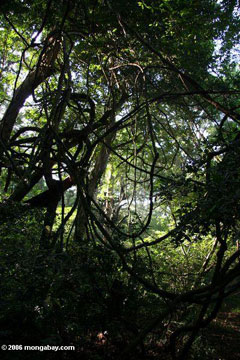A company in Uganda is pressuring the environment ministry to allow it to log a protected forest reserve to establish a palm oil plantation, reports The New Vision.
BIDCO, a Kenyan company, has been lobbying since 2006 to log the forest reserve on Bugala island in Lake Victoria, but has face stiff resistance due to environmental concerns, including deforestation, sedimentation, and biodiversity loss. This time, in a letter written by the agriculture minister, Hope Mwesigye, and directed to the environment ministry, the claim is the plantation firm wants to acquire only grasslands inside the forest reserve that are adjacent to its existing oil palm concession. BIDCO is partnered with the Ugandan government in the project but has yet to win approval from the environment ministry. The company is seeking 10,000 hectares to develop the plantation. It currently has about 8,000 under control.

|
Speaking to The New Vision, Jessica Eriyo, the Minister of State for Environment, voiced concern over the proposal.
“The grasslands occur in patches of one and two acres. Giving them out will result into fragmentation of the forest ecological systems with consequential loss of environmental services,” she was quoted as saying. “Kalangala forests are still evolving and the grassland areas are important for feeding, mating and breeding of some of the species that live in the forest.”
The controversy comes nearly two years after the Ugandan government decided not to issue permits to BIDCO for clearing additional rainforest on Bugala. With the permission of the government, the firm had already chopped down thousands of hectares of forest on the island but, in so doing, had tarnished its reputation. At the time BIDCO warned that the “negative publicity” was jeopardizing its credit rating.
Uganda’s annual deforestation rate has climbed 21 percent since the end of the 1990s. The country lost an average of 86,400 hectares of forest—or 2.1 percent of its forest cover—per year between 2000 and 2005. On a generational time scale, Uganda lost 26.3 percent of its forest cover (1.3 million hectares) between 1990 and 2005, mostly due to subsistence farming and cutting for fuelwood, but increasingly the result of industrial activities. This forest loss is directly threatening some of the highest concentrations of biodiversity in Africa: Uganda is home to more than 5,000 plant species, 345 species of mammals, and types of 1,015 birds.







